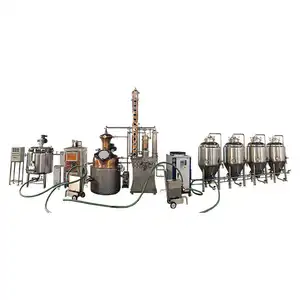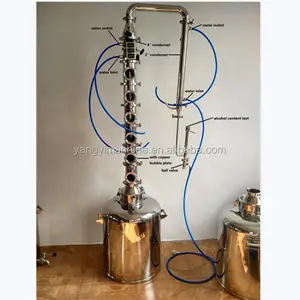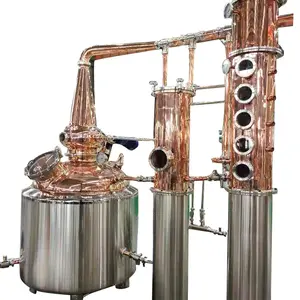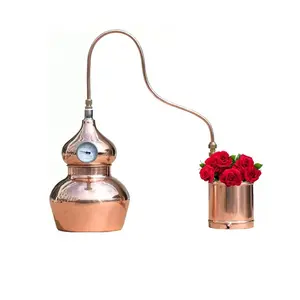(17352 products available)







































































































































































































































An alcohol distiller is a device used to separate the components of fermented liquids, such as beer or wine, in order to create high-proof alcoholic beverages. Alcohol distillers work based on the principle of boiling point differences between the liquids and their components. In the distillation process, the fermented liquid is heated until it starts to boil. The boiling process creates vapor, which is then cooled down and collected as distilled liquid. Different types of alcohol distillers are available.
Pot Still Distiller
A pot still distiller is a traditional alcoholic distillation device. Distillers that make whiskey, rum, and brandy commonly use pot stills. A pot still alcohol distillery consists of a boiler and a condenser. The boiler heats the fermented liquid, and the vapor rises to the condenser. In the condenser, the vapor cools down and transforms back into the liquid. The pot still distiller works based on two times distillations. In the first distillation, a liquid with lower purity is produced, and in the second distillation, a liquid with higher purity is produced. Pot still distillers usually have a big capacity. Many alcohol distillers will choose pot still distillers when making liquor with deep flavors.
Column Still Distiller
A column still distiller is also called a continuous still or patent still. The column still distiller is an advanced alcoholic distillation device. It consists of two column towers: the rectifying column and the analyser. The distillation process in the column still distiller happens at the same time. The fermented liquid is put into the analyser. The boiler heats the column analyser. The process boils the liquid and creates vapor. The vapor rises to the rectifying column, and other parts of the liquid stay in the bottom part of the analyser. In the rectifying column, the vapor cools down and transforms back to the liquid. The column still distiller then extracts the higher-purity distilled liquid. The column still distiller works based on the temperature difference among various fermented liquids. It is a suitable choice for distilling vodka, rum, and gin.
Hybrid Still Distiller
Essentially, a hybrid still distiller combines column still and pot still distiller features. The hybrid still distiller works like the pot still distiller. However, it also has a fractional distillation column attached above the boiler. The column can separate the components of the fermented liquid more precisely. The pot still and column still hybrid distiller can produce a variety of liquors with different thicknesses and tastes.
Here are some crucial distillation apparatus specifications and their maintenance requirements:
Material Quality
Alcohole distillers are made from materials like stainless steel or copper. Hence, the equipment should be cleaned promptly after use. Therefore, it can be maintained and prevented from being contaminated by residue distillates. Additionally, the alcologist should avoid using harsh chemicals or abrasive materials to clean the equipment. When used, it can result in damage or contamination of the material.
Capacity
The alcohol distillation apparatus's capacity depends on the intended production volume. For small-scale distillers, it ranges from 5 to 50 liters, while large-scale ones range from 100 liters to several thousand liters. To maintain the equipment, regularly monitor and calibrate its components. It ensures accurate volume and capacity. Also, check for leaks and make necessary repairs. This helps to prevent any issues that can affect the distiller's efficiency and production capacity.
Temperature Control
Distillation equipment with precise temperature control allows consistent and repeatable distillation processes. Hence, to maintain the temperature control system, one should calibrate the alcohol distillation machine's temperature sensors regularly. This ensures accurate readings. Also, users should clean the temperature control components periodically to avoid residue buildup that can affect their functioning. Moreover, periodically inspecting and adjusting the distillation process is essential. This will help optimize the temperature and improve the distillate quality.
Cooling System
Alcohole cooling systems in distillers can be maintained by regularly cleaning the cooling coils. Also, using distilled water or recommended coolant is required to prevent mineral buildup. Inspecting the cooling system components, such as hoses, pumps, and fans, for leaks or damages is essential. At the same time, promptly making necessary repairs is vital to ensure optimal cooling efficiency. Additionally, avoiding overheating the equipment during operation is necessary, as this can strain the cooling system.
Power Source
The source powering the alcohol distillation machine can be electric, steam, gas, or solar. Thus, the power source should be appropriately configured during installation. This ensures proper connection and compatibility with the equipment. Additionally, the power supply should be stable during operation. That is, it should not fluctuate or experience interruptions. This prevents damage or malfunctioning of the distillation apparatus. In case of any power-related issues, one should consult a qualified technician for assistance.
The alcohol distiller maker is used in different scenarios, as shown below.
Commercial scale distilling
Industries use large alcohol distillers for commercial scale distilling of different distilled beverages. Distilling plants, breweries, and distilleries use industrial distillers with a huge capacity on a consistent basis to create significant amounts of whiskey, vodka, gin, rum, and other popular distilled beverages. The final products are sold to supermarkets, liquor shops, and other retail outlets.
Craft beverage production
Small and medium-sized distilling companies or craft breweries use mid-size alcohol distillers to produce their own unique brands of distilled beverages. The devices allow the smaller companies to have full control over the raw materials, flavors, and production techniques they use, thus adding artisan superiority to their final products.
Commercial-scale distilling
Industries use large alcohol distillers for commercial scale distilling of different distilled beverages. Distilling plants, breweries, and distilleries use industrial distillers with a huge capacity on a consistent basis to create significant amounts of whiskey, vodka, gin, rum, and other popular distilled beverages. The final products are sold to supermarkets, liquor shops, and other retail outlets.
Craft beverage production
Small and medium-sized distilling companies or craft breweries use mid-size alcohol distillers to produce their own unique brands of distilled beverages. The devices allow the smaller companies to have full control over the raw materials, flavors, and production techniques they use, thus adding artisan superiority to their final products.
Research and development
Universities, research institutions, and R&D centers can use alcohol distillers for alcohol distillation technology research and development, as well as method verification. They can use the devices to study the distillation process, experiment with different distillation techniques, or develop new distillation technologies, among other things. The small or mid-size alcohol distillers provide versatility and flexibility for various brewing recipes and distillation methods.
Capacity:
When buying a distiller, it's essential to initially evaluate the required capacity. This is dependent on the stock needs of the business. Selecting the right size is important, as it can influence both operational efficiency and cost.
Apparatus type:
Be familiar with the different types of distilling apparatus. Pot distillers are traditionally used for making whiskey, while reflux distillers are more suitable for achieving higher purity alcohol. Consider which apparatus aligns better with specific production goals.
Materials and craftsmanship:
The materials and craftsmanship of an alcohol distiller play a major role in its durability, performance, and the quality of the distilled product. Alcohol distillers are typically made from stainless steel, copper or a combination of both.Evaluate the distiller's construction carefully. Ensure that the welds, seals, and joints are properly done. Quality craftsmanship can significantly affect the lifespan and functioning of the distiller.
Ease of use and cleaning:
Production efficiency and product quality can be negatively impacted if the distiller is difficult to operate or clean. Consider the user-friendly design features of the distiller, like intuitive controls and clear instructions. Regular cleaning and maintenance of the distiller can help preserve the flavor of the distilled products.
Safety features:
Alcohol distillation entails certain risks. Alcohol vapors can easily catch fire, while high-temperature operations can pose burn risks. Prioritize distillers that are fitted with safety features, like explosion-proof lids, pressure relief valves and insulation safety guards.
Budget:
Finally, it is important to choose a suitable distiller by balancing the budget with business needs. Set a realistic budget for purchasing the distiller. Apart from the purchase cost, also consider the operating, maintenance and incidental expenses related to the distiller.
Q1: How is an alcohol distiller different from an alcohol still?
A1: They are the same. Some people call it an alcohol still while others call it an alcohol distiller.
Q2: How does an alcohol distiller work?
A2: An alcohol distiller works by boiling the fermented liquid. The boiling liquid then releases vapor into the condenser. As the temperature rises, the compounds with lower boiling points (including ethanol) exit first. They change back into liquid form in the condenser. The distiller collects them in a container. The distillation process can be repeated several times to separate the alcohol from other compounds.
Q3: Can someone buy an alcohol distiller for personal use?
A3: People can buy and use alcohol distillers for personal use in countries where it is legal. They use it to produce small quantities of essential oils, purified water, or moonshine. Before buying an alcohol distiller, check its local laws and regulations.
Q4: What is the trend of the alcohol distiller market?
A4: The market is quickly growing. Research shows the global alcohol still market was valued at US$284.6 million in 2021. It's expected to reach US$340.5 million by 2028.